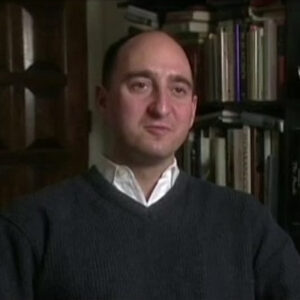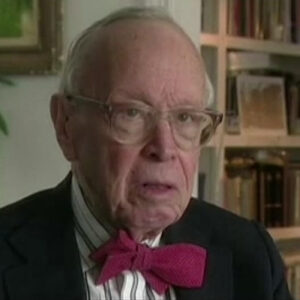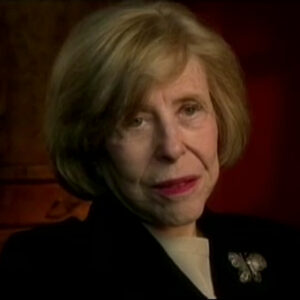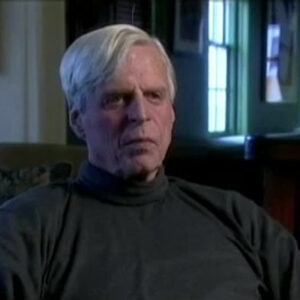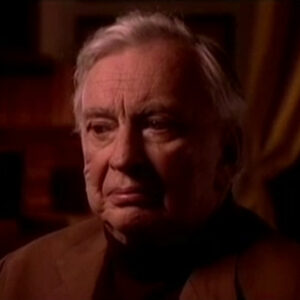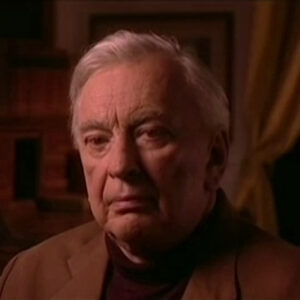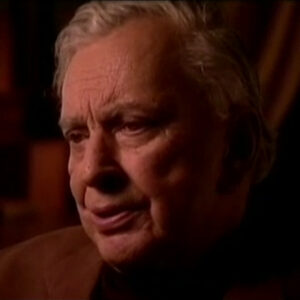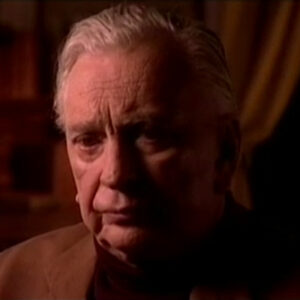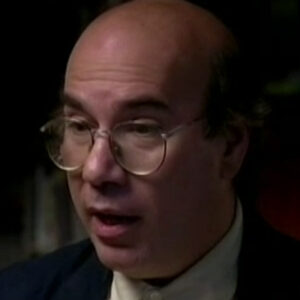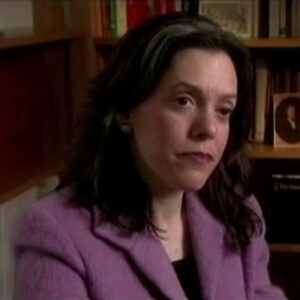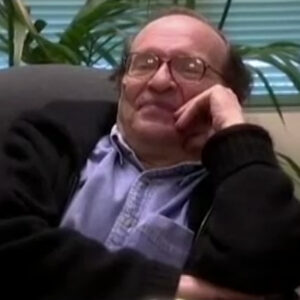Speaker I would think it remains true that Gore Vidal still seems a very mixed bag to many serious readers whom I know. He once told me that he thought that his exclusion from the university cannot.
Speaker Had something to do with his.
Speaker Over at homoeroticism. But I always found that a rather dubious kind of assertion since. Invariably, throughout the history of the world, such a remarkably high percentage of the major writers have been homo erotic in their orientation. He is so, so good an entertainer.
Speaker Both both on and off the page. That may at times get in the way of people’s perception of what it is that, in fact, he’s achieved in his writing.
Speaker What would you think of what do you think his strengths are as a.
Speaker Well, the DA has to two very different. Modes of strength or ability as a. Writer of narrative fiction.
Speaker And he never has been able to bring them together. He is primarily a historical novelist.
Speaker And probably we are past the point where, with very rare exceptions, historical novels. Can be taken with the highest seriousness by many readers, they seem in a sense outmoded or coming from another time in every sense. And the other is, of course.
Speaker Wickedly.
Speaker Satiric in both senses, SHC, I see, as well as a satire of which the most famous and the best is certainly Myra Breckinridge, which would include works like Duluth and Myra, and then not for a scintillating, at least to me, life from Golgotha. And there have been other works in that mood by him. And I do remember remarking when I wrote something extensive about his novel, Lincoln.
Speaker That it was a sort of sorrow to me, and I suppose I still feel that way, that you could not have a work by Vidale which would somehow combine or fuse the modes of Myra Breckinridge and Lincoln or Burr. But I suppose that not only would lie beyond his abilities, but really lie beyond anybody’s ability, since the murders are antithetical, they they would cancel cancel one another out. The serious issue, I think, is the whole question of whether a historical novel which really foregrounds its historicism.
Speaker Can be easily accepted by what shall we say, whatever advanced readers, whatever strong or authentic readers we have left. There are exceptions, but are.
Speaker They don’t necessarily foreground the historical aspect. That’s a great model, in my judgment, is the blood meridian of Cormac McCarthy, certainly his finest work and one of the most astonishing works by a living American writer that actually takes place. In two periods, separated by a couple of decades on the Mexican Texas border in the mid 19th century, a bit earlier than that even and.
Speaker It’s a book that I’ve read repeatedly and written a good deal about I never. Have the sense, as I read it, when I’m in the midst of reading it, that this is a historical novel.
Speaker It’s too appalling and overwhelming in its immediacy, too shocking for that, since Fidel does take on the burden of the historical novelist, in a sense, he willingly competes. With historians, since most of our historians do not write very well at all, on the whole, I, I prefer to read Vidal at least in selected works, certainly, even though I have friends, a couple of them Lincoln scholars, who insist to me that the view of Lincoln and Vidal’s novel of that title is very much distorted. Oh. I find myself very persuaded by the book.
Speaker Let’s talk a little about.
Speaker You wrote that.
Speaker That would be dollars and like it is, a masterly American historical novelist who has found his truest subject, which. Which is our national political history, when our political and military histories were won, one thing and one thing only, the unwavering will of Abraham Lincoln to keep the states united because imagination of American politics then and now is so powerful as to compel or those are your words.
Speaker Well, the primary the primary strength of Gore Vidal as a historical novelist seems to me to be his obsession with American power politics.
Speaker And it is somewhat convincing to me that he finds the beginning of our imperial presidency with Abraham Lincoln, who, after all, did suspend habeas corpus and who did very much take the law into his own hands and who. Hold the country together.
Speaker At a very high price in blood, I’ve always wondered about that, though I don’t know that this kind of wonder has much to do overtly with Vidal’s novel Lincoln. I mean, one always wonders, had Lincoln not been elected or had some person of lesser strength and Will and Drive been elected?
Speaker And the South had seceded anyway, and that president had been content to let the South go with the subsequent history of the United States have been like I mean, the revenge of the South is partly why we have our hideous current politics.
Speaker You know, the southern Republican Party is the dominant wing of the party and in some sense has been governing. The rest of us are for some time now.
Speaker It’s no accident that our president is a sort of transplanted Texan, that the heads of the Republican Party in the House are from Texas, that the.
Speaker Senate minority leader, as he is now and may he remain minority leader, is the abominable Trent Lott of Mississippi.
Speaker The revenge of the South upon the rest of us is is the post Reagan Republican Party.
Speaker And perhaps if the South had been allowed to depart in peace, it would have been better sooner or later they would have had to come back.
Speaker Sooner or later, they would have had to abolish slavery on their own.
Speaker No Western country was going to go into the closing years of the 19th century and maintain legal slavery. It would have been impossible. But this hasn’t got much to do with Gore Vidal.
Speaker How does Vidal’s poor portrayal of Lincoln differ from other, more widely accepted portraits?
Speaker What I find most interesting about.
Speaker Vidal’s Lincoln.
Speaker Is that he really does seem to be there, warts and all, his curious secular mysticism is present, his profound fatalism, his extraordinary political shrewdness.
Speaker And. Deep understanding of how to manipulate others in order to secure his own power for what he took to be the purposes of the nation. And the peculiar darkness of his nature, including that.
Speaker Very opaque marriage to. To Mary Todd Lincoln, that comes through very strongly in the book, and as I say, I have good friends who are great admirers of Lincoln, including of Lincoln’s own writing, who are very angry about the book.
Speaker It’s odd, I think, that he does demystify Lincoln, but I don’t think he’s tearing Lincoln apart. I mean, I think he admires him. That’s what I don’t understand. Why this.
Speaker I think that in.
Speaker A complex way, the book does show what might be called Vidal’s cold and unloving admiration for Lincoln. His Lincoln is not a.
Speaker National myth or the beloved Father Abraham or the martyr of our.
Speaker Final emergence as a nation state.
Speaker It is it’s remarkably effective, dramatic portrait, whether or not it is it is wholly true to a particular scholar’s interpretation of the historical Lincoln or not.
Speaker There is considerable ambivalence, I think, in Vidal’s treatment of Lincoln in the book, but that that probably makes it more interesting when you simultaneously have great affection for and some considerable revulsion for the same person. And you managed to get both of them onto the page as effectively as Vidal does there. It makes a curious contrast with Burr, which is almost as good a novel, which I think second best among the more sort of standard, or at least the novels of American history by the novel.
Speaker But there are. Because the ambivalence is not there, because he wholeheartedly or but identifies himself with BRX hate, the empathy is so strong that it is probably less interesting.
Speaker And certainly less complex kind of a portrait’s.
Speaker For one thing, it seems to me that Inver, the he’s what’s beautiful about Lincoln is he presents him from all these points of view, people who adore him and people who disliked him, which gives us, you know, multidimensional view.
Speaker What we forget is what the doll reminds us of very effectively, which is that Lincoln was at least as widely hated even in the North during his own lifetime as he was loved or admired, that there was always enormous resentment and distrust of him. And that comes across very effectively.
Speaker Very effectively in the book.
Speaker The book the book is a puzzle, I think to me in the end, I haven’t read it in a number of years, but I read it twice very carefully before I reviewed it. And I went back to it a couple of times after that.
Speaker I think what makes it in the end a strong work is that one frequently feels.
Speaker In reading Vidal, that’s a book, doesn’t get away from him enough that he keeps his two hands firmly on it and knows too well what he is doing in the case of Lincoln.
Speaker I think Lincoln got away from him to a certain extent.
Speaker And you get a kind of dramatic. Quality.
Speaker Suggesting that the figure without necessarily merging completely with the historical Lincoln, whoever he may have been.
Speaker That’s the figure both is and is not what Fidel wants him to be, that is to say some some energy, perhaps creative energy, and Fidel does break loose there.
Speaker The only other place in his writing career that seems to me to happen, where you get a kind of wonderfully uncontrolled exuberance side by side with a powerfully held in exuberance is in Myra Breckinridge, which.
Speaker Becomes perfectly hilarious and really, really spins out of control and the wild energy of it is is a kind of delight. There are also I haven’t read the book in many years.
Speaker But you did right, that I’m fine, even with the times that you had had had read it at the time that you wrote.
Speaker She said, I read that it’s continued to give me pleasure. Why is that?
Speaker Well, it is it is a work I would still endorse for wicked pleasure, and I hope sometime I will find my copy of it and read it again.
Speaker Partly.
Speaker Partly there is.
Speaker He kind of. Delite. Throughout my. In. Exploiting the fundamental androgyny that after all, human beings possess to one degree or another, it doesn’t benefit Fidel or any other writer to mention him in the same breath as a way of Shakespeare.
Speaker But Shakespeare’s fundamental insight into all of us, or one of his fundamental insights is the. Androgynous quality in all human beings.
Speaker And of course, I’ve always found both amusing and wise.
Speaker Vidal’s argument that it’s foolish to talk about human beings is being either a heterosexual or homosexual, one can only speak about human beings and say that there are some of them who prefer the other gender and some of them who prefer their own gender and some of whom sexually are attracted to both.
Speaker You said a wonderful thing about that, that I love where you said that after you explain that you said that this sort of polemic of my era is the burden of my upbringing with a burden borne of lightness, wildness and skill.
Speaker Oh, yes.
Speaker Oh, the best thing about Myra as a book is it’s not only that to some extent it gets away from Vidal.
Speaker But that.
Speaker It’s not a tendentious book at all, it’s full of joy, it’s full of a kind of wicked glee at everything it portrays, including its satirical portrait of various Hollywood figures. But it’s mockery also of gender roles has a kind of permanent pleasure built into it, it’s a it’s a book I think that does people does people good it.
Speaker There are so few books of that kind are it was once a definite strain in American literature that the great master of it was Nathaniel West in Miss Lonelyhearts and the Day of the Locust and to some extent Arcore million. And there was Terry Southern and the Magic Christian. But Terry stopped writing or didn’t write very much after that and then died when doesn’t really see much in that particular vein that Fidel was so effective in Meira.
Speaker Ah, I didn’t much like Delyth and I was not happy with her life from Golgotha when feels.
Speaker Perhaps it’s too late in the day, he must believe, to go back to that way now. Perhaps he’s just not interested in it anymore. But I suppose something in me still wonders.
Speaker If it wouldn’t be possible for him as his historical series, more and more approaches the present. If some of that wickedness were not allowed to manifest itself in some historical novel yet to be written by him. I must say that to this day of the public performances of Gore Vidal that I’ve seen, what I most delight in were his exchanges on television. I guess it was the Democratic convention where everything went to pieces. Was that 1968? It was in the it was the year that Hubert Humphrey got nominated and William Buckley and Vidal were on together and came close to murdering one another. I thought that was a very delightful exchange. And I myself favored Vidal and still do.
Speaker When Myra Breckinridge was published, that came out in 68, oh, I didn’t know that.
Speaker I wouldn’t say that back in 1968, the Myra was considered a shocking book. It was a little startling.
Speaker It was it was, after all, in a recognizable American vein of satire.
Speaker And one that I wish we had more recent examples of.
Speaker But by 1968, I don’t think very much could shock anyone anymore. The counterculture had been raging since at least 1965 or 1966 or so. I don’t know that one realized in 1968 and it’s now 34 years later that it was going to sound triumphant.
Speaker Now, we have no culture except the counterculture.
Speaker I mean, we don’t have universities anymore. We have the counterculture. The media are just part of the counterculture and universities are part of the media. I, I keep telling people here that they don’t like to hear me say that we should call ourselves a media diversity rather than a university.
Speaker One thing I wanted to make sure, right, yeah, even to me, oh, no, you haven’t got a chance, kids, you haven’t got a chance.
Speaker Those are perfect.
Speaker I don’t like to use women in that way. But why not? Why not. Why not? So let’s go. Well, you had going back to.
Speaker Two, I won’t let me why you’re on the line of the comic convention or comedy stream.
Speaker Someone said that Gore Vidal is it comes from two streams, you know, an American literary ancestor, Henry James and Mark Twain. Would you.
Speaker I was thinking about Twain before for not using his name when I was talking about Myra and about that sort of rancid side and Gore Vidal. There is a very authentic strand of.
Speaker Great. Oh, amazing. They obviously fell for you, child.
Speaker There’s a very authentic strain of the Mark Twain, you know, whom I love best at his most outrageous.
Speaker There are two wonderful short pieces by Mark Twain, one of which I reprinted recently in an anthology are.
Speaker It’s called Journalism in Tennessee and begins when somebody enters the offices of the Johnson County Morning Glory and War Room, where he rapidly observes all sorts of gunplay taking place between the editors of Rifle Tennessee newspapers.
Speaker And then there’s another fierce piece called Cannibalism in the Cars, in which in the early days of the railroad in upstate New York, a train gets stranded in the snow and under the circumstances, the passengers. Cast lots and start to eat one another for dollar for dollar has a definite relationship to that side of trade, the side that brings forth that curious book called The Mysterious Stranger.
Speaker I’m not so sure that Henry James seems to me a kind of literary precursor of Vidal, though Vidal obviously might like to think so. The Henry Adams, you know, of the historical novels is actually closer.
Speaker James is not James. His imagination is not moved by politics, not even princess. It just really does not interest him at all.
Speaker Where is Henry Adams is obsessed with it as far as Fidel is? Louis Auchincloss, who stems from Edith Wharton more than he does from James.
Speaker In sort of gentler companion in some of his historical novels to the DA.
Speaker Yeah, I think of Gore Vidal as our our our current Henry Adams.
Speaker Yeah, there it would be legitimate if you think of Henry Adams as a novelist, to think of Gore Vidal as the closest thing to a current successor to Henry Adams in terms of a novel like democracy.
Speaker I don’t know that the other side of Henry Adams, the religious and speculative side, shows up in Inverdale, but is a is a cheerfully secular writer, which is one of the things that’s wrong with live from Golgotha.
Speaker He really can take what he satirising seriously enough to do a proper job on its.
Speaker Well, I think Gore Vidal is very interested in religion, but not he’s not mystical at all.
Speaker So that’s where his similarity to Henry Adams splits.
Speaker You said you wrote that there’s a split in the door between the man of letters who has a friendly contempt for politicians and the boardroom and would make a remarkable senator.
Speaker I think I do remember wondering why the Dow had not been more successful in politics.
Speaker Of course, the obvious course, as he himself said, the one time we discussed it, is that a professedly homo erotic candidate in those days did not get very far. It would be less of a problem now, I would think. I mean, Barney Frank regularly gets re-elected from his rather enlightened Massachusetts district.
Speaker But I would think that at his age, Vidal would not want to waste any more time on electoral politics.
Speaker He always says that he was doing, in a way, bred to be a politician and would have liked it and that he was born to be a writer.
Speaker Let’s see, have there been?
Speaker Well, it’s not quite true, the refutation of Vidal saying that while he was bred to be a politician but was born to be a writer and that he didn’t think you could do both. There is Benjamin Disraeli. That’s the only one who gives a very great and successful politician and a rather effective novelist. Sybil is quite a book and some of the others are not bad.
Speaker But I would suppose that Disraeli is the only major exception that I can think of.
Speaker And this really ends with a very different personalities in every way, which is really the only one that he says, oh, he says, don’t mention Winston Churchill. This a terrible.
Speaker Do you think that Fidel’s upbringing in political Washington gives him an edge in his understanding of Lincoln as a politician?
Speaker I’m not sure that I would ascribe.
Speaker And if it does insights to his upbringing or his ancestry or the context that he’s always known.
Speaker So well.
Speaker There is is a kind of. Primal zest.
Speaker For political environment, which seems to be a. Present in his personality, not not that I know the personality very well, but mostly as one gets to know it through the writing.
Speaker It is it is, I suppose, a little. A little surprising to me.
Speaker That. Gifted as he is. He has not.
Speaker Achieved more books as strong in their very different ways as Lincoln and Burr on the one side and.
Speaker Mirror on the other. Ah, I’m fascinated by the figure of Jonah and the apostate, so I found I found Julian of some considerable interest.
Speaker I’m not so sure that the treatment is as interesting as the figure himself and probably Ipsen in that huge play, Emperor and Galilean, which I’m sure of it almost probably did better with Julian as a character than Fidel could.
Speaker Creation or. Has a very interesting kind of speculative imagination moving through it.
Speaker And I guess I prefer to most of what other books, but I wonder.
Speaker If as a professional writer, he hasn’t been, in a sense, driven to write too much. When fear sometimes that he has scattered his gift in too many directions. In too many places. That he’s diffused his energies, but that may be an illusion on one’s part. I mean, people in the end only do what they can do. They know their limitations are necessarily. Indistinguishable finally from their strengths.
Speaker And he has done as well as as all but a few.
Speaker I mean, I. I could not.
Speaker Turned to him as readily as I reread Cormac McCarthy or Philip Roth or Thomas Pynchon or Don DeLillo among current novelists, but I just as soon reread Gatford House, reread Saul Bellow or most of the others.
Speaker Four, what do you think he will be remembered?
Speaker What is most memorable about the all the personality, of course, has great public fascination, and doubtless if one knew him a great private fascination, and insofar as the personality gets into the books, as it certainly does in Mirror.
Speaker It produces, I think, permanent work are.
Speaker I don’t know whether the historical novel. As a genre or as a subdivision of Alejandra will make a return. And people’s sensibilities, it’s it’s so puzzling now in the 21st century to know whether literature in the traditional sense has a future at all.
Speaker So it’s very hard to make secular prophecies of that of that kind. I sometimes wonder.
Speaker If Fidel would not have written more memorably had he been more of a romancer, as it were, by which I mean if instead of writing the novel as a form, particularly the historical novel, he had worked more in the mode of historical romance, the sort of thing that Sir Walter Scott did so well, though, of course, we don’t read Scott. Nowadays, though, a book like The Heart of Midlothian is an extraordinary book or read Gauntlett. But one feels that except with Lincoln and to some extent for the representation.
Speaker Of deep, inward human character and personality.
Speaker Is not really part of dollars a gift. That he can be a lot more vivid at representing places and atmospheres and states of being, as it were, and political climates.
Speaker Then the richness of an individual personality, though Lincoln is the exception and Burr may or may not be an exception. I’m not sure I would have to know Fidel fairly well.
Speaker And I don’t at all to know whether or not Burr is a kind of self-portrait, as I suspect it is.
Speaker Well, he always denies that.
Speaker I didn’t know that, but I definitely see Gore in Burma and, you know, as he would say, well, realists are always hated. You know, he’s definitely a realist and he thinks Burr was a real.
Speaker What does it mean to call Aaron Burr a realist or to call Videl a realist?
Speaker I’m not sure. I don’t really know. Much more about the historical bear than I have absorbed in reading Vidal’s novel. I don’t know that by my literary temperament. The author of the books by Vidal that I’ve read through the years strikes me as being a realist in the sense say that. Zola is a realist or Theodore Dreiser is a realist. He’s not he’s not a naturalist or naturalistic writer of that sort at all.
Speaker There is an element of a fantasist in him. There is there is a gift for well, it goes back to the other statement that I made.
Speaker There is a gift for romance writing and for sustained fantasy in him, which is why perhaps I’m just rephrasing my. Nostalgic notion that if only he could have used the sort of thing he did admire with this sort of thing he did in Lincoln, antithetical as those strands are, he would have broken through to.
Speaker A clearer importance than he necessarily seems to have.
Speaker But I’m not basing that on academic considerations, even though I am a lifelong oh, I hadn’t realized which one is or that that that’s the facts found. It means a fax is coming through. It’ll stop in a moment.
Speaker This must be the fax from.
Speaker Yes, that’s strange. I didn’t get rid of it or it’s going to go on to this, but I don’t know how it came to be. So we’re all there?
Speaker Well, I think we’re probably pretty much covered with a little part of the Vadas waterfront. Right. One more question.
Speaker You mentioned about his his standing in the, you know, the academy world and.
Speaker Well, I don’t think he really has much standing in the academic world, but the fact that that cuts no ice with me one way or the other, the.
Speaker When I was a young.
Speaker Teacher here at Yale almost half a century ago, I was engaged in a constant struggle against the academic new critics, as they were then called, sort of neo Christian critics of T.S. Eliot School.
Speaker And then after that, I found myself in an endless struggle against French oriented critics.
Speaker And then since then, it’s a hopeless and bloody struggle against the total destruction of the universities and colleges in the English speaking world and cultural matters because they have been taken over by.
Speaker Considerations of gender, ethnicity, race, they have been politicized abominably and we have so-called cultural studies now which have replaced literary study.
Speaker I fear and I’m sure that Fidel would hardly be pleased by this, since he wishes to be judged by aesthetic standards and cognitive standards. I fear that. If he survives in academic circles, it will be in the same mad way that Thomas Mann, a very great writer, is now taught and appreciated, mostly because they have taken him out of the closet.
Speaker And so Monds barely repressed homoeroticism seems to be what interests people most in him. One would hate to see Vidal. Preserved as a homo erotic novelist, persay, but I’m reasonably sure he wouldn’t want that either, but it really doesn’t matter, you know.
Speaker I don’t know where literary criticism is to be found anymore. There’s very little of it around.
Speaker There’s just about none, I repeat, in the academic institutions of the English speaking world. There certainly is nothing out there in the so-called public sphere. I mean, the New York Times Book Review cannot be called literary criticism. And for my money, the New York Review of Books can’t be called thought, which is why I gave up writing for them a long time ago.
Speaker We don’t have literary standards anymore, so.
Speaker On that note, some people think that Gore Vidal will be remembered most as. And essayist, do you have any opinion about four dollars?
Speaker The dollar is certainly an interesting essayist.
Speaker He is a fierce polemicist. And again, that tremendous energy of discourse that he summons can be highly entertaining. But he’s not, by and large, a personal essayist, is he? I mean, he’s not going to be the next Montaigne or oddly enough, the next Freud, since I think that’s what Freud will survive as a sort of the montane of the 20th century. He is very much a political essayist and a social social commentator in his essays.
Speaker I don’t know what the survival value of that would be either, but I think almost all questions. I mean, here I am, someone who has spent my life trying to define canonical standards and to exemplify them and to fight for them, I. Don’t know that we really have them anymore. I mean, I’m very conscious of the fact, as I would put it, that we have lost the war and that anything one can do now is just, you know, guerrilla action, rear guard action.
Speaker Aesthetically and cognitively speaking. Literary judgments are lost in the wasteland of. Our contemporaries.


